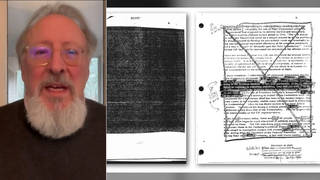
Guests
- Scott HortonColumbia law professor and a contributor to Harper’s magazine, where he writes the blog, “No Comment.”
We look at the case of jailed former Governor Don Siegelman. He is currently serving a seven-year, four-month prison sentence on charges of bribery, conspiracy and mail fraud. We speak with attorney and Harper’s magazine contributor, Scott Horton. [includes rush transcript]
Transcript
JUAN GONZALEZ: We turn now to Alabama and to the case of jailed former Governor Don Siegelman. He’s currently serving a seven-year prison sentence on charges of conspiracy and bribery.
Jurors last year ruled that Governor Siegelman was bribed by HealthSouth founder Richard Scrushy for a seat on the state health board. Prosecutors said Siegelman was bribed with $500,000 in contributions to his 1999 lottery campaign. Siegelman also was convicted on a separate obstruction of justice charge.
But critics say Siegelman is the target of a political witch hunt. The Justice Department has yet to comply with a request from Congress to release documents about the case. The House Judiciary Committee is gathering information about this prosecution and others that Democrats suspect were pursued for political reasons.
AMY GOODMAN: Scott Horton has been closely following this story. He’s a Columbia Law professor and contributor to Harper’s magazine, where he writes the blog “No Comment.” He joins us now in our firehouse studio here in New York. Welcome to Democracy Now!, Scott Horton. Tell us who Don Siegelman is.
SCOTT HORTON: Good to be with you. Well, Don Siegelman is the most important Democratic Party politician in Alabama in recent years. He was an electoral wonder, a figure who was able to command a good part of the vote even in the largely Republican south part of the state. He was elected to every major office that the state of Alabama had to offer. He was viewed essentially as the nemesis of the Republicans in Alabama.
AMY GOODMAN: And what happened?
SCOTT HORTON: It now looks increasingly like he was a target of a political vendetta that reached into and involved the Department of Justice in a political prosecution. And, in fact, we had a really astonishing development in this case back in May, when a Republican lawyer, Jill Simpson, who had been involved in the electoral campaign of his Republican opponent, Bob Riley, filed an affidavit, in which she described a conversation she had participated in with a man named William Canary. Now, he’s a native New Yorker, actually, referred to frequently by Alabamians as “the carpetbagger,” who is a prominent Republican kingmaker in Alabama, the head of the Business Council of Alabama. And he stated in this conversation that he had talked to Karl, and Karl had spoken to the Department of Justice, and they didn’t have to worry about Don Siegelman anymore. He was going to be taken care of. And he went on to say, “My girls are going to take care of Siegelman.”
Well, in fact, the U.S. attorney who brought the case against Siegelman is Leura Canary, his wife, and the action was also joined in an earlier phase by Alice Martin, the U.S. attorney in the Northern District of Alabama, a woman, by the way, who is currently under investigation for perjury, who also is very, very close to Canary. So this linked the case directly to Karl Rove and to political motivation. We took — spent a lot of time looking at Simpson’s affidavit, her motivation, and found it was really fully corroborated all across the board.
JUAN GONZALEZ: And you’ve written in one of your articles that you believe that the resistance of the White House to releasing the emails of Karl Rove may be, to a large degree, revolving around this case.
SCOTT HORTON: I think that’s right. I mean, I think — of course, this all came up on the national scene as a result of an investigation into the dismissal of eight U.S. attorneys, in which Rove was deeply involved. Of course, subsequently, we’ve learned, it’s probably a dozen or more than a dozen, not just eight. But there clearly was resistance and concern about things that went on at a much earlier date, and this goes back was to 2002, late in the year. So this is, you know, perhaps the first well-documented case of deep involvement by Karl Rove in the prosecutorial process, in fact a stunningly corrupt involvement, I would say, using the prosecutorial machinery for a political purpose that staggering.
And here, I think, there was a double motive or maybe even a triple motive involved. It involved eliminating the most important, most powerful Democratic figure in the state from political contention. It involved also dealing with the corporate corruption issue, because, remember, HealthSouth was big on the agenda. And, in fact, Richard Scrushy had been a major funder of the Republicans in Alabama. So this was a way of diverting attention. It also involved redirecting resources, which in that state had been following the Abramoff case. They were taken off of that investigation, which promised to involve leading Republican politicians, and instead they were directed at Siegelman.
AMY GOODMAN: We’re talking to Scott Horton. He’s a Columbia Law professor. He’s a contributor to Harper’s magazine, where he writes the blog “No Comment.” And today he’s talking about the — well, you call him the most important, most significant Democrat in Alabama, who is in jail right now.
SCOTT HORTON: That’s correct. He’s sitting in prison in Texas.
AMY GOODMAN: So why is the House Judiciary Committee involved with this?
SCOTT HORTON: Well, I think people took a close look at the case after the affidavit and began to realize it was dotted with gross irregularities from beginning to end. That is, the conduct of the prosecutors did not follow well-established Department of Justice guidelines. There was very clear evidence of involvement of political figures in Washington at the highest level, not just from the affidavit, but even from the way it was touted at the beginning with press conferences. In fact, there was a remarkable coordination between press conferences the Department of Justice gave and statements that were released by the Republican Party in Alabama. So it was done for clear political effect.
But I think the real censure came at the end of the day, when, after the trial and sentencing, 44 attorneys general from around the country, Democrats and Republicans, submitted a petition to Congress saying there’s something horribly wrong with this case, it really requires an investigation by Congress. That, as far as I know, has never happened before.
JUAN GONZALEZ: And what about the appeals process for Siegelman? He’s already in jail. Did he exhaust his appeals process?
SCOTT HORTON: The appeals process is just beginning right now, and in fact, you know, the first matter that will come up will be his request to be released pending appeal. One of the really unusual things here is that the judge handling the case —- by the way, the judge handling the case is a former member of the Executive Committee of the Alabama Republican Party who had an open and notorious grudge involving Governor Siegelman, so how he came to handle the case is another real stunning fact about this case. He denied bail pending appeal, and in these sorts of political cases -—
JUAN GONZALEZ: And normally the politicians exhaust all their appeals before they go to jail.
SCOTT HORTON: Absolutely, as we know with Governor Ryan in Illinois right now. So, you know, that’s just another example of how this case was bizarre. In fact, he directed that Governor Siegelman be placed in manacles and handcuffs and taken before waiting television cameras to be shown on the evening news in Alabama, something that a number of Republican attorneys general I talked with described as “absolutely extraordinary.”
AMY GOODMAN: Scott Horton is our guest. Coming up in our next segment, we’re going to be talking about Grace Paley. Grace Paley died last — well, yesterday at her home in Vermont, the great writer and poet. But, Scott, before we wrap up with you, this judge, Mark Fuller, explain who he is.
SCOTT HORTON: Well, as I said, he was a member of the Executive Committee in Alabama. He rose to the judiciary on an appointment from George W. Bush. He has very, very strong ties to the Alabama Republican Party. He previously served as a district attorney. That was his appointment just before he became a judge. And in that position, when he left, Governor Siegelman appointed his replacement. His appointment started an audit and raised all sorts of questions about strange expenditures that this judge had made. And the judge responded, saying, “This is a politically motivated attack on me,” of course, meaning by the Siegelman administration. The case then was filed. There was a prior case before a judge in the Northern District of Alabama. That was dismissed. And then a new case was begun in a different district and went to this Judge Mark Fuller. I’m still investigating how the case came before Judge Fuller. It seems highly irregular, I’ll say.
AMY GOODMAN: How does this all fit into the overall story of politicization of the Justice Department, Scott?
SCOTT HORTON: Well, the allegation that started all this was a study that was done by two professors at the University of Minnesota. They said there were seven prosecutions by this Justice Department of Democrats for every one by a Republican. And if we look at Alabama, it may be the strongest single example of this phenomenon. The Department of Justice went after prominent Democratic elected officials and disregarded corruption that surrounded Republican officials. And, you know, this is one of the real centers of the Abramoff scandal, with a mass diversion of funds and casino gambling money going into the coffers of the Alabama Republican Party, not investigated, not dealt with, not charged.
JUAN GONZALEZ: And even this extraordinary situation of purges or house cleanings within the Justice Department itself for failure to do these kinds of prosecutions, it’s almost stunning in terms of the unprecedented nature of all this.
SCOTT HORTON: I think that’s right, and, of course, the real answer to this question lies deep inside the Justice Department. I’ve been pursuing that end for some time. The information I have right now tells me that this prosecution was being directed not only at the top of the Public Integrity Unit, which really was the seat of the politicization inquiry. It’s that and the Civil Rights Division. But beyond that, that people at the top of the Justice Department and beyond that were deeply involved tracking and directing this case from the beginning. And the end of the day, I think we’re going to see that trail lead back to Karl Rove and his office.
AMY GOODMAN: Where was the media in this story?
SCOTT HORTON: That’s a really interesting question. The Alabama media seems to be — even today, when this is emerging as one of the biggest issues on the national stage, you wouldn’t know that to pick up and read an Alabama newspaper. They are uninterested in it. To them, it was completely mundane political scandal. They, for instance, have not reported about the impartiality issues surrounding Judge Fuller. Not a word of that has appeared in any major Alabama newspaper, so it’s clearly a failure of the independent media down there.
And also, the prosecution throughout this case launched its case using the news media, so there were stories about the grand jury proceedings. Evidence that was produced had appeared in two major newspapers throughout, the Birmingham News and the Mobile Press-Register, which shows a remarkably cozy relationship.
JUAN GONZALEZ: And several of the Alabama papers are owned by a major national chain, the Newhouse chain, right?
SCOTT HORTON: That’s correct.
JUAN GONZALEZ: And what’s been their role?
SCOTT HORTON: I would say that they were deeply involved in supporting and pushing the prosecution of Siegelman throughout, and now that that has exploded and issues are arising about it, they are, let’s just say, remarkably incurious.
AMY GOODMAN: I wanted to switch gears a little bit, having you in-house, Scott Horton, and ask about the Bush administration acknowledging for the first time that telecommunications companies spied on Americans, collaborating with the government’s warrantless domestic surveillance program. Mike McConnell, the director of national intelligence, making this admission in the El Paso Times.
SCOTT HORTON: I think that’s a stunning admission that is going to materially advance litigation that’s been brought against the telecommunications companies. I think the biggest problem that the plaintiffs, on behalf of consumers, had in those cases was proving that there was this collaboration between the administration, which I think very clearly violated FISA —- in fact, I think Admiral McConnell acknowledged that in his interview. He said they needed to get immunity. But they need immunity because they broke -—
AMY GOODMAN: They want retroactive immunity.
JUAN GONZALEZ: Retroactive immunity.
SCOTT HORTON: Exactly correct, because they violated a criminal law. I mean, it was — what was done was, in fact, a felony. They’re very concerned about it. I think this also relates to that late-night visit that Alberto Gonzales paid to John Ashcroft at his hospital bed, trying to get him to sign a document. You know, my sources are telling me that general counsel at the telecoms were saying they wanted an opinion from the attorney general that said that this was OK, that it was lawful, and John Ashcroft — note this — failed to give, refused to give that opinion.
JUAN GONZALEZ: This whole situation where you now have — you almost long for the days of Ashcroft compared to what Alberto Gonzales was involved in at the Justice Department. What’s the fate of the Justice Department under this Gonzales leadership?
SCOTT HORTON: Well, I think there’s a horrible morale problem at the Justice Department right now, and I’ve spoken with a lot of people there, and what I hear is just billowing resentment towards the political leadership of the department and, I think, resentment particularly focused on Attorney General Gonzales himself and a half-dozen of his senior political aides, who occupy positions like deputy attorney general and assistant attorney general. They are viewed as having betrayed the reputation of the department and tarnished its integrity. And I think it will take decades to win public respect after this.
AMY GOODMAN: What’s happening to the Civil Rights Division in the Justice Department, the resignations?
SCOTT HORTON: Well, it’s in a state of turmoil right now. I think that this department has effectively been left without a rudder.
AMY GOODMAN: Who resigned?
SCOTT HORTON: The professional staff has resigned, but we also have Bradley Schlozman, you know, who’s a former senior figure in the department, who has resigned. A number of other senior political appointees have resigned.
AMY GOODMAN: Wan Kim, as well?
SCOTT HORTON: Yes. So this department has effectively been gutted, and it makes it very, very difficult for it to function. The Bush administration had taken it and tried to divert it from its historical function of protecting the interests of minorities and protecting voter rights, instead tried to use the department as a tool to suppress minority voter rights, exactly the opposite of its historical role. And I think that upset a very large part of the staff. In fact, you know, no hirings of minority lawyers in recent years.
AMY GOODMAN: Scott Horton, I want to thank you for being with us, Columbia Law professor, contributor to Harper’s magazine. He writes the blog there called “No Comment.” We’ll link to it.












Media Options